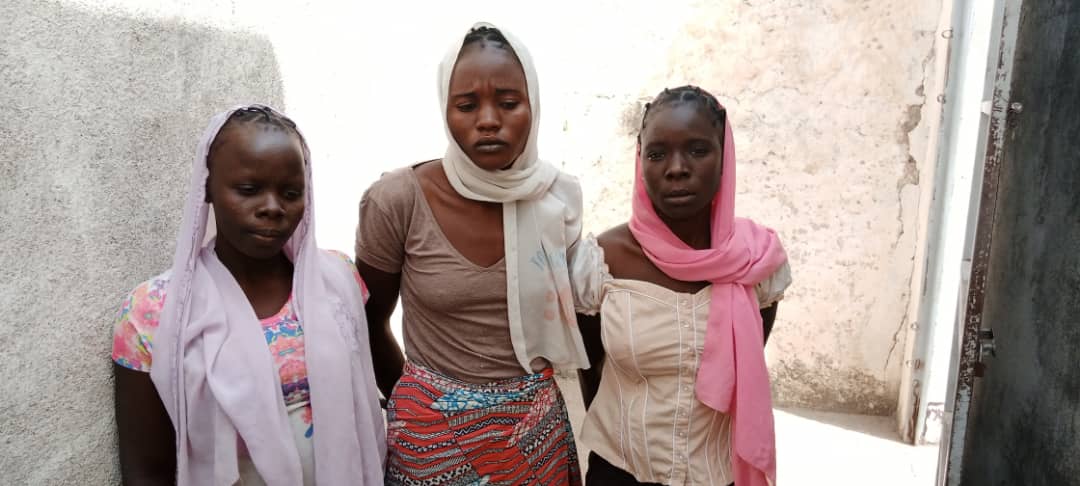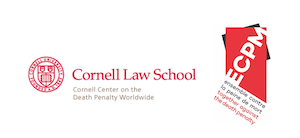Time to read - min

Martha Weteya, Marie Dawandala, and Damaris Doukouya (from left to right) at the Mokolo Prison
Press Release: Three Juveniles Sentenced to Death Face Retrial
On Friday June 26, three women may face a lengthy prison sentence when they are tried for espionage. They were previously sentenced to death after fleeing Boko Haram violence when they were still minors. All three have already spent over 5 years in prison, two of them with very young children. We urge the authorities of Cameroon to ensure that they receive a fair and speedy judgment.
Marie Dawandala, Damaris Doukouya and Martha Weteya were only 17 years old when they were arrested and accused of supporting Boko Haram in October 2014. Damaris was taken into police custody with her three-month-old daughter, and Marie was six months pregnant. The three teenagers had left their native villages in impoverished Northern Cameroon to work as domestic servants with their husbands across the Nigerian border. In the midst of escalating violence perpetrated by the militant group Boko Haram, they were forced to flee home across the border, like tens of thousands of civilians displaced since the crisis began.
As the attacks intensified, “the Cameroonian authorities arbitrarily arrested hundreds of alleged supporters of Boko Haram, many without sufficient investigation, and charged them with terrorism, an offense punishable by death,” explains Marie-Lina Samuel, Africa Project Coordinator at ECPM (Together Against the Death Penalty). International organizations have decried this repressive campaign as a human rights crisis. In its report “Sentenced to Oblivion: Factfinding Mission on Death Row,” ECPM highlighted the proliferation of unfair trials in terrorism cases.
After their arrest, the three girls were stunned to learn that they were accused of belonging to the very militant group they had fled just two weeks prior. For four months, they had no lawyer and no interpreter, even though the pre-trial investigation was conducted in French, a language they do not understand. Marie gave birth to a son in detention. The three women and their two children were then transferred to Maroua Central Prison, where conditions are life-threatening. The facilities lack basic hygiene, are severely overcrowded (built for 350 inmates but housing over 1,400), and offer inadequate food, drinking water, and medical care. The women raised their children as best they could for the next five years in this inhumane environment.
In April 2016, Marie, Damaris, and Martha were brought before Maroua’s military tribunal, where they were charged with espionage, conspiracy to commit insurrection, and membership in an armed gang. After an expedited trial that lasted only a matter of hours, Marie, Damaris and Martha were convicted on all counts and sentenced to death by firing squad.
“The trial proceedings read like a litany of fair trial violations,” says Delphine Lourtau, Executive Director of the Cornell Center on the Death Penalty Worldwide. First, the military tribunal that imposed the death sentence had no authority to try the women under Cameroonian law as they were minors at the time of the alleged crimes. International law generally prohibits the trial of civilians by military tribunals and absolutely prohibits the use of the death penalty for juveniles. Second, there was no direct or material evidence supporting the convictions, and no defense or prosecution witnesses were called. Third, the women’s state appointed counsel did not provide adequate representation. The defender had not yet fully qualified as a lawyer and only met once in private with her clients, in a short break during the trial. Fourth, all of the proceedings were conducted in French, and the women were not always provided with an interpreter. “So little did they understand their own trial that it was not until they returned to prison and spoke to a prison guard that they realized they had been sentenced to die,” adds Lourtau.
In 2019, recognizing that it lacked jurisdiction over minors, the military tribunal vacated the women’s death sentences. The prosecutor nevertheless decided to retry the women before a civilian court. Marie, Damaris and Martha were transferred to a smaller prison in Mokolo, where detention conditions are even more desperate. Moreover, after the outbreak of the COVID-19 pandemic, Damaris and Marie had to accept a religious group’s offer to care for their children outside of prison. They have received no visits or news of their children’s welfare for the past three months.
Marie, Damaris and Martha will attend their next court hearing on June 26. They hope that the court will render a speedy judgment after postponing their trial six times in a row since the beginning of this year. “The court should also take into consideration the time they have spent in prison with their children and the irregularity of the proceedings against them to date,” says Lourtau. “After everything they have been through, Marie, Damaris, Martha, and their children deserve a fair trial and a just outcome.”
More information about this story:
https://deathpenaltyworldwide.org/cameroon-targeting-girls-fleeing-terrorist-violence/
Media Contacts:
Delphine Lourtau, Cornell Center on the Death Penalty Worldwide
[email protected]
Michael Luze, ECPM
[email protected]
Co-Signatory Organizations:
ACAT Cameroun (Action des chrétiens pour l’abolition de la torture)
Coalition camerounaise contre la peine de mort
Droits et paix
RACOPEM (Réseau des avocats camerounais contre la peine de mort)
Abdorrahman Boroumand Center for Human Rights in Iran
ACADP (Arab Coalition Against the Death Penalty)
ACAT France (Action des chrétiens pour l’abolition de la torture)
ACHRS (Amman Center for Human Rights Studies)
AEDH (Association européenne pour la défense des droits de l’homme)
Alliance des avocats pour les droits de l’homme
CHESCO (Children Education Society)
CENESA (Civic Education Network for Eastern and Southern Africa in Kampala, Uganda)
Coalition marocaine contre la peine de mort
Coalition portoricaine contre la peine de mort
Death Penalty Focus
FIACAT (Fédération internationale de l’action des chrétiens pour l’abolition de la torture)
FHRI (Foundation for Human Rights Initiative)
Forum marocain pour la vérité et la justice
Hands off Cain
SHAM (Human Rights & Democracy Media Center in Palestine)
Inmates’ voices
Italian Federation for Human Rights
JCADP (Jordan Coalition Against the Death Penalty)
Lawyers for Human Rights International
LAW (Legal Awareness Watch)
Lifespark
OBP (Observatoire burundais des prisons)
Observatoire marocain des prisons
ASBL (Pax Christi Uvira)
SOS Africaines en danger
Sunny Center Foundation USA Inc.
Vietnam Committee on Human Rights
Witness to Innocence
